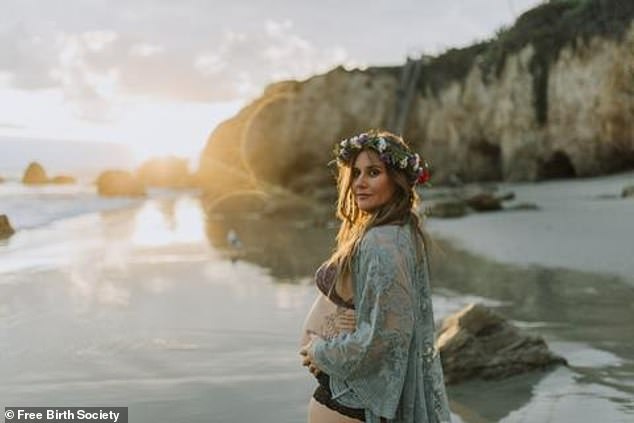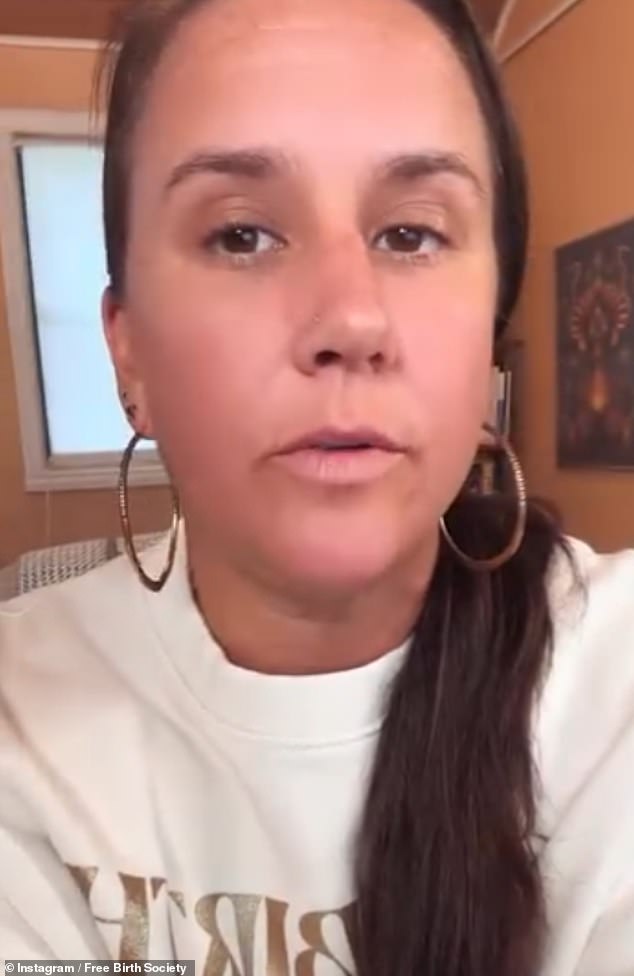A woman who championed the ‘free birth movement’ – which says pregnant women don’t need to seek professional aid like hospital check-ups and scans while expecting – has tragically revealed that she lost her baby.
Emilee Saldaya, 39, from California, who was expecting her third child, shared the devastating news with her Instagram followers, where she shares tips and interviews with others in the community, this week.
‘I am writing with the hardest thing I’ve ever had to share, to endure, to live through,’ she penned in a post to her 131,000 followers.
‘I recently gave birth to a beautiful baby, stillborn at 41 weeks of gestation. Our son, our baby, was not born alive.
‘There are no words for this pain this experience and all that it brings.’
She added that while they are ‘upside down in heartache’, their family is ‘well supported’ and they are ‘deeply grateful’ – feeling ‘the halo of angels around them’.
‘I will be taking a suspended moment for myself and my family in this infinite well of grief before I continue with the always-personal offering of my company.’
Thousands of commenters shared their condolences with Emilee, writing that ‘when one mother grieves, all mothers grieve’.

A woman who championed the ‘free birth movement’ – which says pregnant women don’t need to seek professional aid like hospital check-ups and scans while expecting – has tragically revealed that she lost her baby. A photo from her site, where she also advertises coursed, pictured
The ex-doula started her controversial online community dedicated to ‘unassisted childbirth’ in 2017, calling it the Free Birthing Society (FBS).
‘After witnessing the deep fractures that occur when women give birth within the medical system, I took it upon myself to lead the freebirth movement, reshaping how we experience birth for generations to come,’ she wrote on her website.
‘With over two decades of hands-on experience in birth-work, I’ve had the privilege of supporting thousands of births.
‘I know, without a doubt, that sovereign birth is a transformative journey that can change a woman’s life in the most profound ways.’
The site sells coaching packages, sold for anywhere between $350 to $1,800 which seem to purport to give women all they need to know to deliver their own babies at home.
According to the UN, some 712 women die every day during pregnancy or childbirth – one woman every two minutes.
Reports from the humanitarian group also say some 260,000 women died giving birth in 2023. The US in particular has been spotlighted as having a ‘maternal mortality crisis’.
A Commonwealth Fund write up on the topic last year said: ‘The United States continues to have the highest rate of maternal deaths of any high-income nation, despite a decline since the COVID-19 pandemic.

Emilee Saldaya, 39, from California , who was expecting her third child, shared the devastating news with her Instagram followers, where she shares tips and interviews with others in the community, this week. Pictured in a post
‘And within the U.S., the rate is by far the highest for Black women. Most of these deaths – over 80 percent – are likely preventable.’
It highlighted a growing concern with the level of care for certain demographics in the states.
‘A free birth is nothing special,’ she told Marie Claire in 2021. ‘It’s just staying home and having your baby. But in a very short amount of time, we have convinced ourselves of the need to leave our homes.’
In an interview with the outlet, she recounted the birth of her first child – where, after already being in labour for three days, Emilee and her husband Jonny went to the hospital.
She was concerned that her cervix had become swollen, but did not put on a medical gown or pee in a cup as she was asked too.
Once it was confirmed there was no swelling, Emilee said she felt ‘in power again’ – and got ready to leave.
The pair claim that the doctor was baffled, asking if they had any experience delivering babies and remarking on the ‘danger’ of doing so if not – but eventually let her go with a signed AMA (Against Medical Advice) form.
‘I think women are really waking up, and they are tired of being abused,’ she continued.
‘What I am so obsessed with is watching these women get fierce and be like, “F**k the system. I don’t need this. My intuition can be my guide.”‘
Her disenchantment with medical systems came after working as a doula and midwife’s assistant in Los Angeles – and claiming she witnesses ‘so much violence, abuse and oppressive stuff’ after attending ‘births in captivity for over 10 years’.
When she and Jonny decided trying for their own baby, Emilee said she came across a number of resources on free birthing online – hence the launch of FBS.
The movement has not been without its critics – and women sharing experiences, including one who tried to free birth but sadly experienced a stillbirth in a hospital.
Elsewhere, in 2018, it was reported that a California woman lost her baby after attempting to give birth without professional aid in the desert.
During six days of excruciating labor, the woman – dubbed ‘Lisa’ (not her real name) in a Daily Beast article – contacted the FBS group, sharing her story and asking for advice and support.
She wound up in a hospital, covered in blood. As she’d struggled through days of labour, Lisa had been unable to urinate, developing an acute bladder infection that, she told the outlet, her baby had contracted too.
The infection proved fatal for the unborn baby. Lisa had wanted to be fully present as her baby took its first breaths, with only her husband by her side. Instead, she was put under anesthesia and delivered a stillborn baby, whom she named Journey Moon.
Following the tragic conclusion of her birth story, Lisa posted about it all on Free Birth Society, predominantly to thank the community for its support. But trolls had infiltrated the group, and lit into Lisa, posting horrific comments targeting her.
Research has shown that feeling empowered to make decisions throughout their pregnancy and delivery can have an even greater influence how women experience the process than specific events – like blood pressure changes, or the baby being born breach.
Women’s choices and agency in pregnancy are both civil rights and medically beneficial – but critics accused Lisa and Emilee alike of negligence.
In an emailed response to the Daily Mail’s request for comments at the time, Emilee called the coverage of Lisa’s experience ‘a massive interpretation of the situation, my company and myself myself in the media, not to mention the freebirth movement at large’.
‘The continued exploitation of this tragic story has resulted in very serious threats to my family so this needs to be handled extremely sensitively to all parties involved,’ she added.
Divisive reactions around the methodology have seen Emilee branded a ‘baby killer’ – but many have spoken of their ardent support and ways they have benefited from the resources shared by FBS.
‘Free birthers’ also have insisted that should a medical emergency arise, they absolutely would go to the hospital – but wanted the choice to be theirs to make.
FBS also share disclaimers that they are not medical professionals, with the page existing for ‘educational and informational purposes only’.
Emilee in a recent post, from just two weeks ago, hit out at a popular criticism of the free birth movement on her social media.
‘The opposite of neglect is great care and intention,’ she wrote on Instagram. ‘Isn’t it more neglectful to blindly follow authority – without checking if it’s right, true, logical, or aligned?
‘After 20+ years in birth-work, I have no interest in obstetrics – not from ignorance, but from deep, lived experience. I’ve studied the data, watched the outcomes, and held women in the aftermath. It’s not neglectful to take full responsibility for myself and my children.
‘What would be neglectful is outsourcing that responsibility to a system I know causes harm. My choices are deliberate. They are rooted in great care and intention.
‘This is what is true for me. Your job is to practice and own what is true for you. It doesn’t have to be the same; it gets to be whatever you want.
‘When we, as women and mothers, can move past comparison, feeling inferior, and insecurity, we discover freedom and self-resourced authority.’
The free birthing phenomenon is not just isolated to the US. A 2016 study asked women who had given birth unassisted in the US, UK, Sweden, Finland, Australia and Finland why they chose that method.
‘The most obvious recurring theme drawn from mothers’ comments to researchers is that they chose free birthing as a way of resisting the biomedical model of birth,’ wrote UK midwife and PhD researcher, Claire Feeley, for The Conversation.
Some felt that the risk of unnecessary medical treatments or interventions was more dangerous to them and their babies than were the risks of serious complications in a free birth.
Many simply felt that they wouldn’t have any control over their delivery if it occurred in a hospital.
It was not uncommon for the women surveyed to have already tried a hospital birth – and suffered traumatic experiences.
‘This shows a great loss of trust and faith in healthcare services, and these women embody the link between disrespectful care and the experience of traumatic childbirth,’ Claire added.
Th NHS has advice on ‘unassisted birth’ on its website, where it urges those considering the option to talk to a midwife to get more information about care to make an informed choice.












